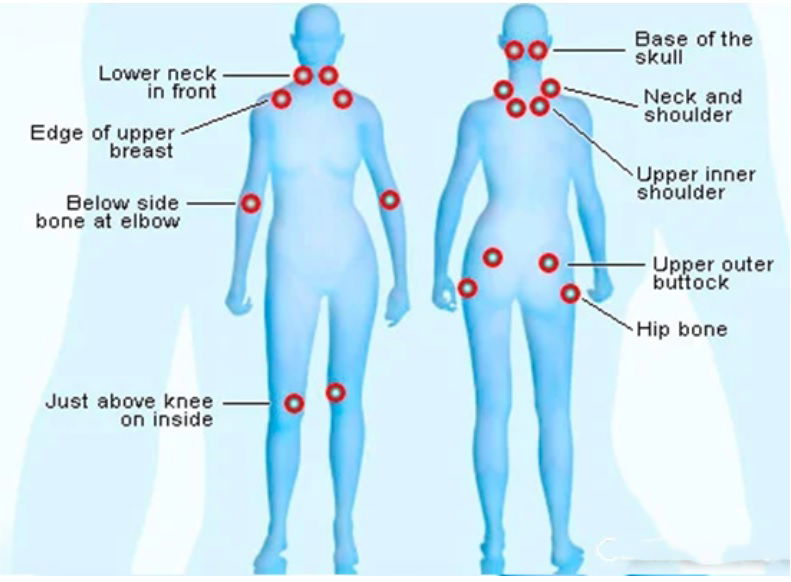Doctor ! I am having Pain all over Body.
Today We will talk about a very common disease called Fibromyalgia !! A common benign disease that is often missed
Understanding and Managing Your Health
Fibromyalgia is a condition that affects how your body feels and how you experience pain. It can make you feel tired, achy, and sometimes even a bit foggy in your mind. While it might seem confusing, we're here to break it down into simple points to help you understand and manage it better.
1. What is Fibromyalgia?
- Fibromyalgia is a medical term that describes a condition where you feel pain all over your body and tenderness in your muscles and soft tissues.
- People with fibromyalgia may also experience fatigue (feeling tired all the time), sleep problems, difficulties with memory and concentration, and decreased urge to have food.
2. What are the common Symptoms?
- Pain Everywhere: You might feel pain all over your body, like a constant ache or a dull, throbbing sensation.
- Tender Points: There are specific points on your body, such as your neck, shoulders, chest, hips, knees, and elbows, that are extra sensitive and can hurt when pressed. ( See picture below)
- Fatigue: Even after resting, you may still feel very tired and lack energy.
- Sleep Troubles: Fibromyalgia can mess with your sleep, making it hard to fall asleep or stay asleep.
- Brain Fog: Sometimes, you might have trouble focusing or remembering things clearly.

3. Do we know the Cause?
- The exact cause of fibromyalgia isn't fully understood, but it's thought to involve a combination of genetic, environmental, and psychological factors.
- Sometimes, it can be triggered by physical injuries, infections, or stressful life events.
4. Who Gets It?
- Fibromyalgia is more common in women than in men.
- It can start at any age, but it's often diagnosed in middle adulthood.
5. How does a doctor Diagnose it?
- There isn't a specific test that can definitively diagnose fibromyalgia. Doctors usually diagnose it based on your symptoms and a physical examination where he may press various parts of your body to check if its painful.
- Sometimes, they might do blood tests to rule out other conditions that could be causing similar symptoms like Arthritis.
6. Treatment:
- While there isn't a cure for fibromyalgia, there are ways to manage the symptoms and improve your quality of life.
- Medications: Your doctor might prescribe pain relievers, anti-inflammatory drugs, or medications to help you sleep better.
- Exercise: Gentle exercises like walking, swimming, or yoga can help reduce pain and improve your mood.
- Therapies: Cognitive-behavioral therapy (CBT) can teach you ways to cope with pain and manage stress.
- Lifestyle Changes: Getting enough sleep, managing stress, and maintaining a healthy diet can make a big difference.
7. Self-Care Tips:
- Listen to Your Body: Pay attention to how your body feels, and don't push yourself too hard on days when you're not feeling well.
- Pace Yourself: Break tasks into smaller steps and take breaks when needed.
- Prioritize Sleep: Create a bedtime routine to help you relax and improve your sleep quality.
- Healthy Diet: Eating nutritious foods can give you more energy and help your body feel better.
- Stay Positive: Surround yourself with supportive people and find activities that bring you joy.
8. Seeking Support:
- Living with fibromyalgia can be challenging, both physically and emotionally. It's okay to ask for help when you need it.
- Talk to your friends and family about how you're feeling so they can better understand and support you.
9. Patience is Key:
- Managing fibromyalgia takes time. Be patient with yourself as you try different strategies to feel better.
- Celebrate small victories along the way, and remember that you're doing your best.
- You are not Alone! almost 2-5 percent of females worldwide has this disease !!
- Remember about certain triggers :
- Cold or humid weather
- Too much or too little physical activity
- Stress
- Poor sleep
10. Working with Your Healthcare Team:
- Your doctor and other healthcare professionals are there to help you. Don't hesitate to ask questions and let them know how you're feeling.
- Together, you can come up with a plan that works best for you and your lifestyle.
Remember, you're not alone in this journey. Many people with fibromyalgia find ways to lead fulfilling lives by taking good care of themselves and seeking support from their loved ones and healthcare providers